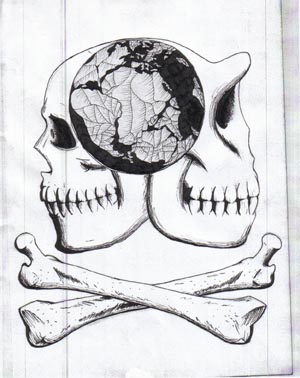Director- Clint Eastwood
Starring- Clint Eastwood, Bee Vang, Ahney Her
Walter Kowalski (Eastwood) wants to spend his remaining years left alone. Having just lost his wife, he's digusted with the greedy behavior of his family, annoyed by the young priest who promised his wife he'd pay special attention to him, he's coughing up blood (an obvious foreshadow to his health), and is further disheartened to find a hmong family moving in next door. Despite his blatant racism, he is haunted by his wartime actions in Korea.
One night, he awakens to hear someone in his garage, trying to steal his 1972 Gran Torino. He grabs his old M1 and investigates, finding a young teenaged Hmong boy. He trips, the boy escapes, and he spends the next day trying to repair the broken entrance.
That night, some Hmong gangbangers stop by the house to recruit their young cousin, Thao (Vang). Thao's sister, Sue (Her) interferes, and the resulting conflict spreads to Kowalski's yard, bringing out Kowalski and his gun, as well as the soon-to-be famous utterance, "Get off my lawn!"
The gang backs off, Kowalski finds out Thao is the one who tried to steal his car, and tries for the next couple days to keep the Hmong neighbors from coming to his house to thank him for protecting them.
He finds himself in this role again, as Sue is threatened by some street toughs who find her in the "wrong" neighborhood. He faces down the hoodlums with a pistol, ordering Sue into his pickup. On the drive home, he unintendedly learns a few things about her culture and softens up.
Thinking his involvement with them over, he is continually annoyed as they keep coming back to invite him to a big family dinner, to make Thao repay through the labor the wrong done to Kowalski's garage, to thank him for turning Thao around into a responsible young man, etc. As they keep coming back, one can see the crusty veneer slowly falling away, and Kowalski, still referring to them as "zipperheads" and "swamp rats", develops a fondness for them that he apparently never had with his own family. He realizes how estranged he really has been when he tried to call his son for some small talk and receives a hurried and disinterested response.
The Hmong gang, however, isn't finished. After a sudden drive-by shooting, Sue is no where to be found. She is dropped off much later, beaten and raped severely. Kowalski has to keep Thao calm despite his own anger brimming over.
Father Janovich (Christopher Carley), who has been stopping in at random times, has become increasingly aware of Kowalski's behavior, and knows exactly what he's capable of. He also knows Kowalski can't be talked out of taking action. When Kowalski stops by the church the next day for confession (which he'd never done in his life), Father Janovich realizes the gravity of the situation in its fullest.
I'm going to stop the synopsis there. The movie is very intense. The characters don't give away too much of the plot in the first half hour (formulaic movies often do it within the first ten minutes), and what they don't tell you, the visuals do (i.e. Kowalski worked at a Ford factory until retirement. He is visibly perturbed as he watches his son driving away from the funeral in a Kia).
We are somewhat desensitized by the racist remarks, particularily because we can't keep up with them. Almost every other word that comes out of Kowalski's mouth is offensive. This turns out to be a verbal trap, because once we've made up our minds that he hates everyone and is generally just a bigot, we see his interaction with his barber, laced with Italian and Polish jokes going back and forth. This from two guys who like eachother.
Her's acting is at first a little forced. When she's teasing Kowalski about his ignorance and mispronunciation of Hmong, it wasn't very convincing. The way she explained her culture sounded a little too much like an educational kid's show. It does get better, however, as the drama and violence ensue.
Vang's performance is surprisingly effective, for its low-key nature. He comes off as a typical teenager with low self-esteem and no direction. As Kowalski works Thao, he actually takes him under his wing, becoming something of a reluctant parent to the kid.
Eastwood reprises his gruff "I don't like anyone" type of character and plays it as though it were his last role (in fact, he's said this is his last acting role in a movie). His constant grimace and annoyed guttural grunts are convincing as he faces Father Janovich, his nosy Hmong neighbors, and a family who finds him more of a massive headache than a family member.
There's also the immense sadness in his character, as well. His memory of Korea continues to haunt him. He never had a close relationship with his kids, and when he finally began trying, it was simply too late. His closer relationship with his Hmong neighbors further serves to remind him of his "former" life both in war and in family (even though the Hmong are Chinese).
The movie, despite its drama, is peppered with humor as Kowalski, having trouble remembering Asian names, makes simple substitutes (Toad=Thao, YumYum=Youa).
I expected the ending, but it was no less heart-stopping. It only lasts a couple minutes, but it feels like forever. It takes something of a Martyr-ish turn, but man, what a movie! Well-done, Clint Eastwood.
Rating: 5/5 Bonedaddies.





No comments:
Post a Comment